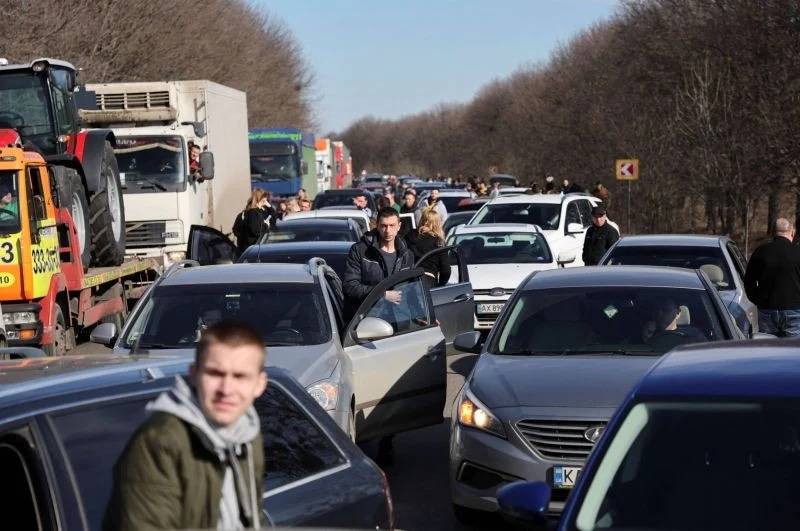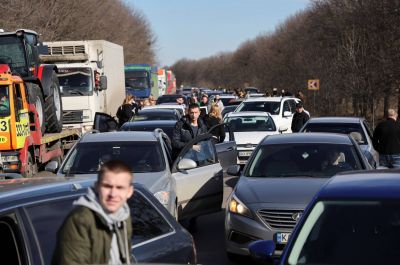
Ukrainians try to flee the city of Kharkiv, after the start of the Russian invasion, February 24, 2022. (Antonio Bronic / Reuters)
Kiev, around 5:10 am Thursday morning. The sun had not yet risen when the walls of the apartment of Mark Tohmé, a 33-year-old Lebanese veterinarian, began to shake. It was at this moment the Russian army began its attacks onUkraine. It is estimated that the offensive has already killed more than 100 people. According to the Ukrainian embassy in Lebanon, Mark is one of the 1,800 Lebanese nationals residing there, but this figure could be as high as 3,700, according to the Lebanese embassy in Kiev.
It’s a scenario that seemed unimaginable for the Lebanese that L'Orient-Le Jour contacted last week. Today, like thousands of Ukrainians, some are trying to flee by any means available. In the early hours of Friday, it was almost impossible to reach them.
"In Lebanon, I lived through the war, so I knew what to do. I went straight to my room and started to check on my relatives here," says Mark, who moved to Ukraine from Beirut in 2007.
He feels the situation is comparable to Lebanon’s July 2006 war, which pitted Hezbollah against Israel for over a month, "but this is two great nations fighting each other. It will be much worse," he said by phone.
In Kiev, the atmosphere is heavy. The noise of Russian planes and helicopters is incessant, as are the sirens in the capital.
"The streets are deserted, very few cars are on the road, restaurants are closed, supermarkets are open but for a limited time. There is no more gasoline and we do not know when the gas will be out of stock. The situation is not reassuring at all," he says. At nightfall, those who stayed at home will turn off the lights "to hide".
Daniel, 29, did not expect Odessa – a port city on the Black Sea where he has lived since leaving Lebanon in May 2019 – to be attacked, since it is far from the Russian border.
When the explosions woke him from his sleep at dawn Thursday, he saw his neighbors packing their suitcases. Very quickly, his "Lebanese reflexes" pushed him to do the same and his partner left for Romania as quickly as possible. They drove more than 300 km on deserted roads and around noon arrived in a country they do not know, without "any plan." If Daniel managed to flee, others remain standed in Ukraine, with no way out. As soon as the sirens sounded in the city of Lviv, Karim*, a Lebanese student, gathered his few belongings and took the road to the airport, only to realize that the air space had been closed. He has no choice but to flee by land, and is considering returning to Poland. It is the first time that he sees Ukrainians considering the worst, he confides, but their "patriotism outweighs their fear."
"I have seen people in the street telling the military that they are ready to fight with them," he says.
Still, he tries to put things in perspective.
"At least here in Lviv, the danger is less than in other cities on the border with Russia."
Karim does silent for a few seconds.
"I just received a notification..." he says. "No, actually, it's okay," he says with a nervous laugh.
Since dawn, his phone hasn't stopped ringing. His parents in Lebanon are terrified that their son will be stranded there.
Deserted streets, overrun supermarkets
"We all thought Ukraine was a safe country. We are in shock," says Walid Khodr, a Lebanese man who has lived in Poltava, in central Ukraine, since 2013 to pursue his studies. A military base in his area was attacked at 8 a.m. while he was sleeping.
"My friends heard the strikes, but not me," he says.
The day before, there was no indication of what was coming.
"But yesterday, the supermarkets and pharmacies were overrun. Everyone is getting ready because we have no idea what will happen next," says the 29-year-old, who represents the Lebanese diaspora in Poltava.
His phone is also ringing non-stop. Lebanese students, some of them based in isolated locations, call him in panic.
“We try to bring them to the cities, but it's risky," he says. “One young man called me, he doesn't know anyone where he lives and doesn't speak the language."
Walid, who opened a business in Ukraine, hopes that the Lebanese embassy will manage to round up the students to leave the country as soon as possible.
"I don't think that those who have been living there for years will leave the country," he says. He hasn't been back to Lebanon in five years because of the current situation.
"I fled Lebanon, but if the situation in Ukraine gets worse, I will have no choice but to return," he says.
On August 4, 2020, Rami*, was in Beirut when the port exploded and several neighborhoods of the capital were blown away. So when he heard the blasts in Odessa at 5am Thursday morning, he immediately understood.
"My family thought I was hallucinating, but I knew. I know how to recognize an explosion," says the 26-year-old Lebanese.
On Twitter, he sees that Ukraine has been attacked in several regions.
"We have packed up all our stuff, gathered important documents, but I don't even know if we can leave the country. My grandmother can't walk. We have a four-year-old daughter and above all we don't have a car," he says.
In recent days, his brother, who lives in Lebanon, kept calling, urging him to leave the country.
"But we didn't believe that a war was really going to break out," he says. “We should have.”
A heavy silence settles in. Since this morning, he and his family have been holed up in a room with the television news on continuously.
"Regularly, we hear the crash of an explosion," he says. "My plan right now, even though it's not really a plan, is to stay home and hope the situation doesn't get worse. Samidoun [we resist]," he says.
* The names have been changed.
Lebanese in Ukraine wishing to leave the country after Thursday morning’sthe Russian military invasion yesterday morning are asked to fill out an online form at this address: https://mfa.gov.lb/Ukraineform, announced the Lebanese Ministry of Foreign Affairs. The mMinistry also called on its citizens "to stay in a safe place". On its Twitter account, the ministry "calls on all Lebanese nationals residing in Ukraine to exercise the utmost caution, and to remain in a safe place". As for those who wish to return to Lebanon and must fill out the form, the ministry assures then to "maintain political contacts with all relevant countries and allies, including Ukraine's neighboring countries, to confirmensure safe return routes for the Lebanese." The Ministry also provided emergency numbers for Lebanese living in Ukraine: 03-242659 (Nawal Lichaa Abboud); 70-615491 (Lara Azzi).
More than a week ago, the Ministry had already advised its citizens to "voluntarily and quickly leave Ukraine, until the tensions abatedisappear and things return to normal."
This story was originally published in French in L'Orient-Le Jour.
